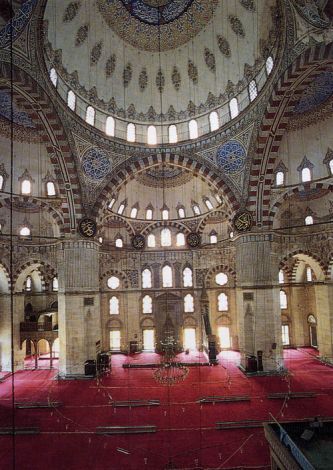NONGOVERNMENTAL ORGANIZATIONS
Nongovernmental organizations, often seen as indicators of democratization, have shown rapid development in Turkey, especially in recent years. The number of nongovernmental organizations, such as foundations, associations and citizen's initiatives, which undertake the responsibilities of the community voluntarily, are increasing every day. Furthermore, a significant majority of these organizations have relations with like-minded international or foreign organizations.
The Foundations. The desire of humans to help one another exists in all societies, and drives the existence of charitable organizations across the globe. In Turkey, there are many foundations for charity, based on donations, which utilize private wealth for public benefit and support public services and research in fields such as education, science, medicine, public health and social welfare.
Turkish foundations developed as early as the Seljuk period (1078-1293) and were institutionalized during the Ottoman period (1299-1920). The number of Turkish-Islamic foundations during this period is approximated to have numbered in the hundreds of thousands. These seminal organizations made contributions to art as well as to the social, economic and cultural life of Turkish society. As a matter of fact, although hundreds of years have passed, it is possible to encounter the influence of these foundational institutions through Anatolian art still around today.
All the works of the foundations have been transferred to the Directorate General of Foundations, which was connected to the Prime Ministry in the Republic period. Radical changes were made in the administration of the foundations with the "Foundations Law" which went into effect in 1935. The Directorate General of Foundations, which has a juristic personality, is responsible today for the management of the foundation properties, the protection of the foundation works of art which have an architectural and historical value and the support of the foundations for their objectives. 9289 monumental works of art of old foundations and 55,231 foundation properties are under the control of the Directorate General of Foundations.
The Gök Madrasah, Sivas, one of the most beautiful examples
of the foundation works in Turkey.
There are 317 subsidiary foundations, which are administered by their own managers, while the Directorate General oversees 5,700 pious foundations, all of which remain from the Ottoman period. Furthermore, there are 160 Community and Artisans' Foundations established by minorities in Turkey, such as the Greeks, Armenians, Jews, etc. The Directorate General also carries out the supervision of new foundations established according to Law No. 903, enacted in 1967.
The number of foundations in the first years of the Republic was relatively low. Thanks to the state's encouragement policy and legal arrangements, a significant increase was observed in the number of foundations established in the succeeding years. Especially in 1967, these foundations became the focus of attention when the Council of Ministers was given the authority to grant tax exemptions to the foundations, and the donations made to the foundations were encouraged by various arrangements in the tax laws. As a matter of fact, the number of foundations, which was only 72 in the period between 1926-1967, has reached 4,534 as of May, 2000.
The great majority of the foundations, which display a great diversity according to the objectives of their establishment, are aimed at social assistance, education and health. Furthermore, in recent years, there have been significant increases in the number of foundations engaged in subjects such as science, technology, research, democracy, human rights, environmental protection, etc. The Contemporary Education Foundation, Turkish Democracy Foundation, Turkish Human Rights Foundation, Foundation for the Strengthening of the Physically Disabled, Contemporary Women's and Youth Foundation, Turkish Foundation for the Struggle Against Erosion, Afforestation and Protection of the Natural Assets (TEMA), Turkish Economic and Social Studies Foundation (TESEV) and Social Democracy Foundation (SODEV) are some of the foundations engaged in influential activities in Turkey today.
Associations. Every Turkish citizen in Turkey has the right to establish an association without prior permission. The associations, which are considered to be a product of the socioeconomic development of the society, were established in the first years of the Republic with the encouragement and under the leadership of the state. Later on, with the increase in the activity in economic life and the developments observed in the social and cultural field, there were significant increases in the number of associations established by voluntary initiatives of the people, as well as in the number of their members. Today, the number of associations engaged in activities in many fields such as sports, culture, health, social assistance, women and artisans associations is around 72,800. Although a large number of associations are based in areas in cities such as İstanbul, Ankara and İzmir, interest has risen in the small-scale associations engaged in activities in Anatolia. A significant portion of the financial resources of the associations are formed by membership dues and donations and revenues collected from publications, lotteries, concerts, exhibitions, etc.
Citizen Initiatives. The citizens who band together for the elimination of existing problems in society, by using their freedom to organize meetings and demonstrations within the rules of democratic society, are able to develop an effective message, most of the time at the local level and sometimes at the countrywide level. The governments support and attempt to take the necessary measures to maintain the cooperative and constructive sensitivity which exists in society. As a matter of fact, numerous initiatives such as the Peace Movement, the 8 March Women's Platform and the Thursday Group, which engage in activities and voice their opinions on the subject of women's rights have become widespread in recent years. The citizens who unite on various subjects, such as the struggle against drugs and alcohol, the protection of the environment, protection of the family, a call for a powerful country and the movement for the formation of a base, and to try to eliminate the existing problems in the society on these subjects, make a great contribution to the development of the consciousness of the civil society.
Reference: Ministry of Foreign Affairs of the Republic of Turkey








